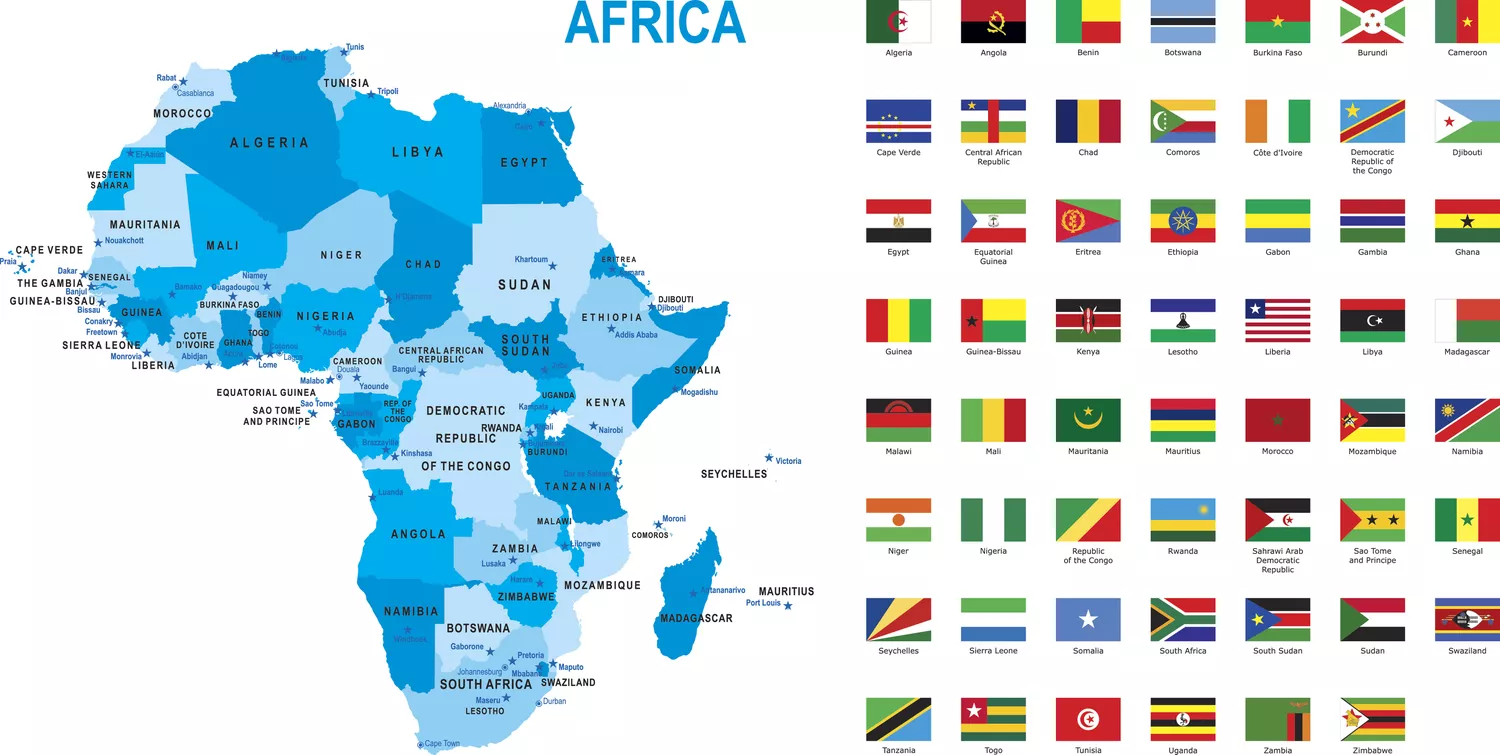Headline
2025: Top 10 African Countries With The Largest Oil Reserves

Oil is one of the main drivers of economic growth in Africa. It fosters international relationships, attracts foreign investors, and is also a major source of revenue. Political instability, oil theft, and insecurity are some of the challenges hindering substantial growth in oil production in some of the African countries discussed in this article, although they still have the largest oil reserves.
Contents
1. Libya
2. Nigeria
3. Algeria
4. Angola
5. South Sudan
6. Egypt
7. Republic of Congo
8. Uganda
9. Gabon
10. Chad
Here are the African countries with the largest oil reserves according to Prime Business Africa:
READ ALSO: Meet 9 African Leaders Who Made TIME 100 Most Influential People List
1. Libya
Libya tops the list as the African country with the largest oil reserves. Despite the political unrest in the country, Libya has still been able to maintain its wealth from oil reserves, which are proven to be 48.36 billion barrels. The country is the continent’s oil leader.
2. Nigeria
Nigeria has the second-largest oil reserves in Africa, with 37.89 billion barrels. However, many challenges, such as outdated infrastructure, oil theft, and insecurity, have continued to erode the country’s progress in oil production. Policies have been enacted to revive Nigeria’s oil industry.
3. Algeria
Algeria has developed solid infrastructure for its natural gas extraction and oil reserves. This has contributed immensely to the economy of the country by being one of the top energy exporters in Africa. Algeria’s oil reserves now 12.20 billion barrels.
4. Angola
Oil is a major support for Angola’s economy, helping with diversification. Despite a decline in production, investment and new offshore discoveries have boosted the oil sector. As one of the largest oil producers, Angola has 7.78 billion barrels of oil reserves.
READ ALSO: World Bank Appoints Africa’s Richest Man, Dangote
5. South Sudan
South Sudan capitalises on its oil reserves because of the significant role it plays in the economy. It makes up over an average of the government’s revenues. The country is now experiencing more increase in output because of production deals. South Sudan’s oil reserves is 3.75 billion barrels.
6. Egypt
Egypt is one of the countries in Africa with a diverse energy sector. The country has been able to advance its refining system and export rate. Investment in the energy sector boosts oil production. Currently, Egypt’s oil reserves is 3.3 billion barrels.
7. Republic of Congo
The Republic of Congo is one of the main oil exporters in Africa, with 2.88 billion barrels. More than half of the country’s revenue comes from oil. Political instability has been causing setbacks, but foreign investment has helped in reducing the effects.
8. Uganda
Uganda now transports oil to the international market since the completion of the East African Crude Oil Pipeline (EACOP). The government secures deals with investors to ensure more productivity. Uganda boasts of 2.5 billion barrels of oil reserves.
9. Gabon
Gabon is not relenting in attracting foreign investors into the country. They have succeeded in expanding their refinery to produce more refined petroleum. Over the years, Gabon’s economy has been strengthened by oil exploration. The country has 2.0 billion oil reserves.
10. Chad
Chad is the tenth among the African countries with the largest oil reserves. Constant investment in the energy sector by foreign investors has helped Chad sustain its oil production, which is now 1.5 billion barrels.
Headline
U.S. Lawmaker Reacts To Nigeria, U.S. Airstrikes

United States Congressman, Riley Moore, has stated that President Donald Trump is determined to put an end to the killing of Christians in Nigeria, warning that further action may follow if the violence persists.
Moore made the statement on Friday via his official X handle.
According to the lawmaker, the strike represents the first step in addressing what he described as the ongoing slaughter of Christians and the broader security crisis affecting Nigerians across religious and ethnic lines.
READ ALSO:US Dept Of War Shares Video Of Air Strikes In Nigeria
“President Trump has been clear that the killing of Christians in Nigeria must end,” he said.
He that the administration’s resolve on the matter should not be underestimated.
“As I stated at the outset: Do not test President Trump‘s resolved in this matter.
READ ALSO:JUST IN: US Forces Bomb Terrorists Camps In Nigeria
“Tonight’s strike in coordination with the Nigerian government is just the first step to ending the slaughter of Christians and the security crisis affecting all Nigerians,” he said.
He stressed that the operation signals a stronger stance by the United States in support of Nigeria’s efforts to tackle terrorism and violent extremism, noting that further measures could be taken if the situation does not improve.
Headline
US Dept Of War Shares Video Of Air Strikes In Nigeria

A video footage of the US military air strikes in Nigeria has emerged.
The video was released by the US Department of War following its air strikes against terrorists in Sokoto.
Earlier, the US secretary of War, Pete Hegseth had confirmed that military air strikes hit terrorists in Nigerians, saying it was deadly.
Later on, the US. African Command, confirmed that it conducted the attacks described as very deadly by President Donald Trump.
Trump said he was only keeping the promise he made earlier last month to strike the terrorists he believes are killing innocent Christians.
READ ALSO:JUST IN: US Forces Bomb Terrorists Camps In Nigeria
Although described as powerful and deadly, the casualty caused by the attack is yet to be released.
Explaining further, security expert, Brant Philip, said the strikes may have been launched “from the USS Paul Ignatius, using a Tomahawk missile.”
The Nigerian government through its ministry of foreign affairs has also confirmed that the strikes were successful.
Watch video here
Headline
JUST IN: US Forces Bomb Terrorists Camps In Nigeria

United States President Donald Trump said US forces conducted deadly strikes against Islamic State terrorists in northwestern Nigeria, and vowed more attacks if the militants keep killing Christians.
“I have previously warned these Terrorists that if they did not stop the slaughtering of Christians, there would be hell to pay, and tonight, there was,” Trump posted on his Truth Social platform, adding that “the Department of War executed numerous perfect strikes.”
READ ALSO:JUST IN: Kano Lawmaker, Sarki Aliyu Daneji, Dies Hours After Colleague’s Passing
Trump stated that the Department of War “executed numerous perfect strikes, as only the United States is capable of doing. Under my leadership, our Country will not allow Radical Islamic Terrorism to prosper.”
The US president wished everyone Merry Christmas, “including the dead Terrorists, of which there will be many more if their slaughter of Christians continues.”
Details later.

 News4 days ago
News4 days agoPHOTOS: New Era In Furupagha-Ebijaw As Okpururu 1 Receives Staff Of Office

 News3 days ago
News3 days agoUBTH CMD Marks 120 Days In Office, Expresses Commitment To Providing Conducive Working Environment

 News3 days ago
News3 days agoFIRS Confirms NIN As Tax ID

 News4 days ago
News4 days agoOPINION: Gumi And His Terrorists

 News4 days ago
News4 days agoFG Declares Public Holidays For Christmas, New Year Celebrations

 Metro3 days ago
Metro3 days agoFintiri Pardons Man Sentenced To Death For ‘Killing Herdsman In Self-defence’, Others

 News3 days ago
News3 days agoOPINION: My Man Of The Season

 News4 days ago
News4 days agoOPINION: Christmas And A Motherless Child

 News2 days ago
News2 days agoJUST IN: Kano Lawmaker, Sarki Aliyu Daneji, Dies Hours After Colleague’s Passing

 Metro3 days ago
Metro3 days agoPetrol Tanker Crashes Into Akpabio’s Convoy, Kills Police Dispatch Rider






























